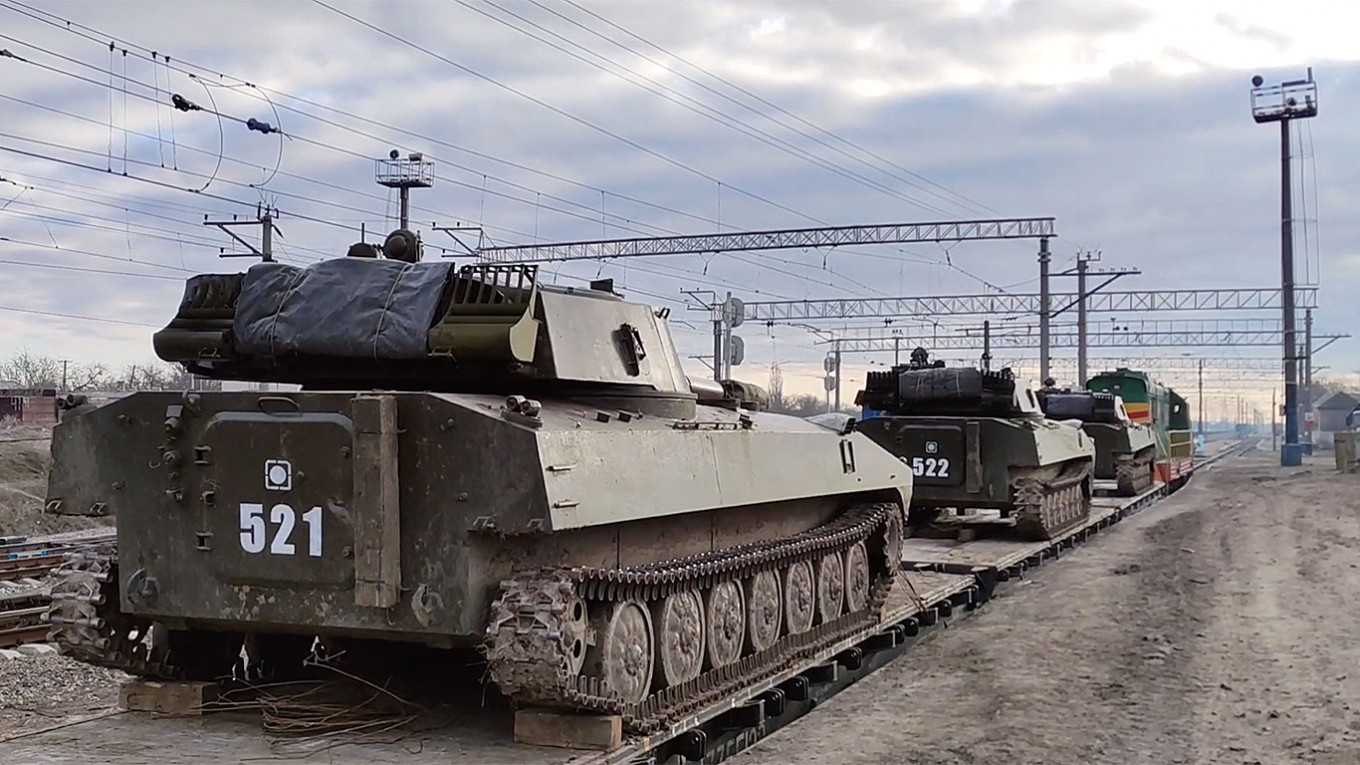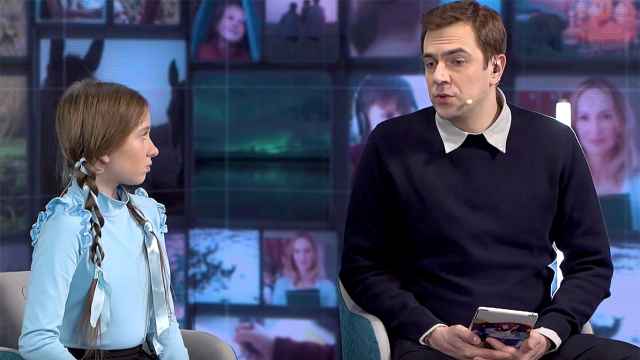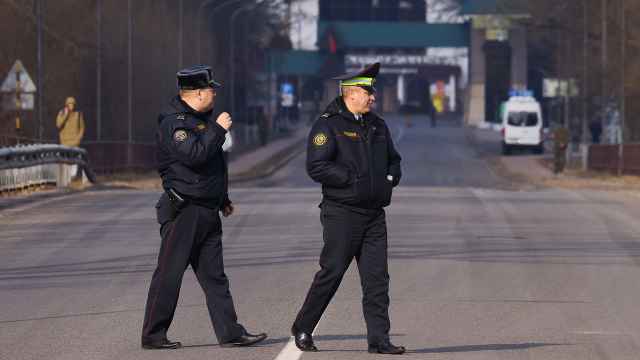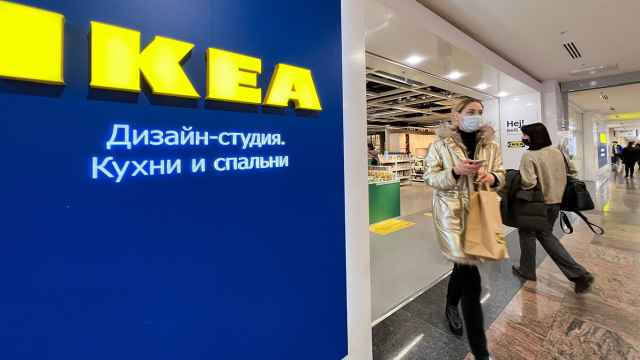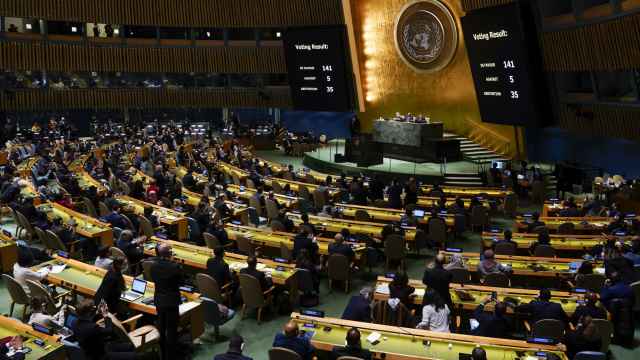Russia’s announcement that it is pulling back more forces from the Ukrainian border has been met with skepticism by Kyiv and its Western allies alike as questions persist about Moscow's willingness to defuse the current crisis.
After his Tuesday talks with German counterpart Olaf Scholz in Moscow, Russian President Vladimir Putin said “a decision has been taken to partially withdraw forces” following what Moscow claims were regular drills near Ukraine and in neighboring Belarus. Putin’s comments came hours after senior Russian army commanders announced that some troops would be going back.
Moscow appeared to hint at further de-escalation on Wednesday, announcing that its drills in annexed Crimea had ended and that soldiers were returning to their garrisons, with footage showing tanks being transported away from the peninsula.
“We react to the reality we have and we don’t see any withdrawal yet,” Ukraine’s President Volodymyr Zelenskiy told the BBC on Wednesday.
“We’ve only heard about it…When the troops do withdraw everyone will see that. But for now, it’s just statements,” Zelenskiy said as he traveled the country to mark a "Day of Unity,” aimed at rallying his people on the day U.S. intelligence had predicted a possible Russian incursion that did not materialize.
Ukraine’s Western allies also said there was little indication so far that Russia was withdrawing its troops from the Ukrainian border.
In a Tuesday address to the American people, U.S. President Joe Biden said a Russian invasion was still “distinctly possible,” warning that a war in Ukraine would not be “painless” for his country.
The speech, in which Biden claimed that 150,000 Russian troops still surround Ukraine in a “threatening position,” suggested expectations are still high in the White House that Russia will take military action.
In a rare instance, Biden also directly appealed to ordinary Russians, stressing the “deep ties of family history and culture” they share with Ukrainians and warning about the consequences of a bloody war.
NATO chief Jens Stoltenberg said on Wednesday that Russia appears to be continuing its military buildup around Ukraine.
"We have heard the signs from Moscow about readiness to continue diplomatic efforts, but so far, we have not seen any de-escalation on the ground," Stoltenberg said.
The latest warnings from Western officials contrast with some of the rhetoric that has come out of Moscow.
The Kremlin on Wednesday reiterated that it welcomes Biden’s readiness to continue talks on the Ukraine crisis.
Russia’s ally Belarus also appeared to be eager to calm Western worries, saying that Russian troops currently there for large-scale joint drills will go back when the exercises end later this week.
“Not a single Russian serviceman, not a single piece of equipment will remain in Belarus after the completion of exercises with Russia,” the country’s Foreign Minister Vladimir Makei said during a press conference on Wednesday.
Russian and Western military experts say that much of the skepticism toward Russia’s apparent de-escalation stems from past instances when it announced similar steps that proved to be short-term. In late December, Russia pulled back about 10,000 soldiers from areas near the border with Ukraine, a move that only temporarily eased tensions.
Ruslan Leviev of the Conflict Intelligence Team, which uses open sources to monitor Russian military activities, said his analysis has not indicated that Russian troops are leaving the border — but rather the opposite, with signs of new deployments to the border regions in recent days.
Leviev also noted in a tweet that some of the troops being withdrawn from Crimea are permanently based on the Russian mainland's western border, meaning their withdrawal would actually place them closer to Ukrainian territory.
Konrad Muzyka, director of the Rochan Consulting analytical firm which focuses on open-source military analysis, told the Financial Times that the “most recent troop deployments suggest that it is not genuine.”
“Over the last few days, there was again an influx of videos which showed new equipment arriving to the border with Ukraine, or near the border,” Muzyka said.
A Message from The Moscow Times:
Dear readers,
We are facing unprecedented challenges. Russia's Prosecutor General's Office has designated The Moscow Times as an "undesirable" organization, criminalizing our work and putting our staff at risk of prosecution. This follows our earlier unjust labeling as a "foreign agent."
These actions are direct attempts to silence independent journalism in Russia. The authorities claim our work "discredits the decisions of the Russian leadership." We see things differently: we strive to provide accurate, unbiased reporting on Russia.
We, the journalists of The Moscow Times, refuse to be silenced. But to continue our work, we need your help.
Your support, no matter how small, makes a world of difference. If you can, please support us monthly starting from just $2. It's quick to set up, and every contribution makes a significant impact.
By supporting The Moscow Times, you're defending open, independent journalism in the face of repression. Thank you for standing with us.
Remind me later.


